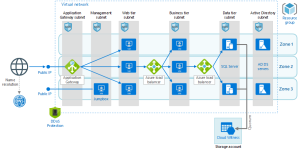
In 2020, I watched countless headlines in Houston media that chronicled the absence of thousands of students that were missing from class. Yet the students did not disappear, they simply were not able to attend classes during the global pandemic because they lacked access to devices and the internet.
This issue of the digital divide wasn’t unique to Houston, the disparity in internet access was happening across America. In fact, in 2019, the Federal Communications Commission estimated that over 20 million Americans didn’t possess strong broadband access.
In July, I was tasked to lead a new nonprofit organization in Houston called Link Health. At Link Health, our organization leverages the health sector to connect patients to the Affordable Connectivity Program and close the digital divide in healthcare.

The organization was founded by an emergency room physician and Harvard University Professor, Dr. Alister Martin, who tapped university students to serve as fellows and digital equity ambassadors. The fellows and ambassadors are placed in clinics and hospitals to actively enroll patients into the Affordable Connectivity Program while they wait to see the doctors. These college students are attacking the problem with fervor and urgency!
In Houston, over 400,000 households are eligible for the Affordable Connectivity Program, but there has only been a 30% adoption rate. Through our partnership with healthcare systems like Legacy Community Health, San Jose Clinic and Lone Star Health Center we have an opportunity to enroll over 200,000 people who are current patients of those systems. In our work, we found that many of those patients that are eligible for the Affordable Connectivity Program need support in completing the application, uploading documentation and then getting the actual discount applied to their internet service account. Our team is there from start to finish in this process.
Although our program is new, we have found success in our clinic- to- community partnerships. Our team has screened over 10,000 patients and enrolled almost 1,000 families into the program. We estimate that through Affordable Connectivity Program enrollments we have helped families save over $290,000 on home internet and our work is just beginning.
We recognize that the Affordable Connectivity Program is slated to sunset when the funds are exhausted. However, in the meantime, our student-led organization will continue to meet people where they are. We will move forward with bringing on new clinical partners and guiding their patients to receive access to these necessary discounts. To broaden our reach, we are sharing resources and marketing material for community health sites that include posters, RX discharge paperwork, brochures and other graphics that promote the ACP.

While news stations are no longer constantly covering stories about students’ connectivity challenges, the issue is still extremely prevalent in many communities. At Link Health we want to assist eligible families in connecting to the internet so that they have access to other resources like telehealth. Opening up access to the internet is one sure fire way to address social determinants of health and we are poised to connect people to the world.
Ar’Sheill Monsanto is the manager of Link Health, which connects patients to broadband access. This piece is exclusive to Broadband Breakfast.
Broadband Breakfast accepts commentary from informed observers of the broadband scene. Please send pieces to commentary@breakfast.media. The views expressed in Expert Opinion pieces do not necessarily reflect the views of Broadband Breakfast and Breakfast Media LLC.



